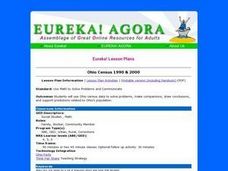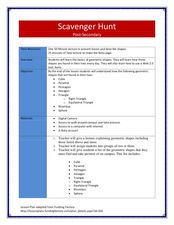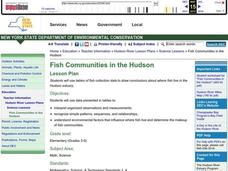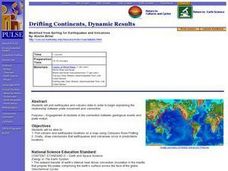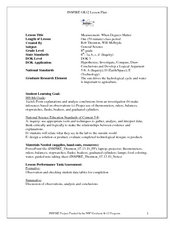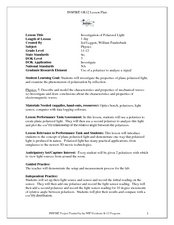Curated OER
Ohio Census 1990 & 2000
Students use Ohio census data to solve problems, make comparisons, draw conclusions, and support predictions related to Ohio's population. They interpret and work with pictures, numbers and symbolic information.
Curated OER
Measuring the Speed of a Wave
Students create an experiment in which they measure the speed of a wave and record the data in a graph. They work in small groups to write the procedure for the experiment and share it with another group for cross checking of the...
Curated OER
Statistical Accuracy and Reliability
Ninth graders assess the accuracy and reliability of current survey data and how it is represented. They design a survey, collect data, and use technology to analyze the data and present the results. Students examine scatter plots and...
Curated OER
Scavenger Hunt
Students collect data about lighting conditions around a room using a light sensor and RCX. They use software to upload and analyze the data in order to draw conclusions about light intensity in the room.
Curated OER
Science Happens in a Social Context
Students discuss how the same data is viewed differently between historians and scientists. Using the data, they compare and contrast the vocabulary used and the focus of attention. They analyze the conditions that help spread diseases...
Curated OER
Enquiry 1: Introduction
Students explore war memorials from the First World War. After visiting a local war memorial, students research the soldiers listed. As a class, they discuss the the impact of the war on their community. Students research their...
Curated OER
One Square Meter
Students examine various ecosystems using scientific inquiry. Using the local area, they assess the characteristics and conditions in one square meter. They report their findings in the form of a survey map and data sheet. They...
Curated OER
Fish Communities in the Hudson
Students use tables of fish collection data to draw conclusions about where fish live in the Hudson Estuary. Given available data they interpret organized observations and measurements and recognize simple patterns, sequences, and...
Curated OER
Feeling Crabby?
Students analyze data to investigate the influence of water depth on size among deep-water crabs. They interpret results from this data, and apply the results regarding appropriate fishery regulations.
Curated OER
Drifting Continents, Dynamic Results
Students plot earthquake and volcano data using a Compass Rose Plotting. They explain the relationship between plate movement and connection. They draw conclusions that earthquakes and volcanoes occur in predictable locations.
Curated OER
"Region" Out to Everyone: Geographic Regions Defined
Students define the term region. They collect data about New England after watching a short video. They organize the information into a regional concept map. They draw conclusions based upon their data collection and analysis.
Curated OER
Responding to Alcohol: What's Important?
Learners examine the effects on motor functions in mice. They make observations and graph their data. They analyze the data and draw conclusions in each of the three experiments.
Curated OER
Water Quality Monitoring of Natural Water
Students set up their own monitoring system. They collect samples from an appropriate sampling site. They analyze data and determine the water quality. They present their information to the class and draw a conclusion.
Curated OER
A Magnetic Personality
Fifth graders experiment to discover how many paper clips different types of magnets can pick up. They make predictions, carry out the experiment and collate the data.
Curated OER
Dose-Response Relationship
Pupils complete their observations of germinating seeds. They create a graph showing all of their data and develop a dose-response curve. They compare their data with other groups and analyze the curves.
Curated OER
Using PING to determine factors of Internet delay
Students use the concepts of PING to examine Internet delay. They discuss why PING is used in the Computer Science industry. They practice interpreting data as well.
Curated OER
Measurement: When Degrees Matter
Eighth graders record the temperature change of the beakers. In this general science lesson, 8th graders create their own data table for recording observations. They discuss experimental results and cite real life applications.
Curated OER
Science: Hurricanes As Heat Engines
Pupils conduct Internet research to track the path of Hurricane Rita. They record the sea surface temperature of the Gulf of Mexico during and after the hurricane and draw conclusions about how hurricanes extract heat energy from the...
Curated OER
Plants Under Attack
Third graders will identify the four needs for plant survival and gain skills and confidence in using scientific measurement tools, probes as well as the spreadsheets and graphing capacity of a computer to represent and analyze data.They...
Curated OER
Using the Scientific Method to Determine Which Conditions Best Favor Plant Growth
Seventh graders examine how the environment can affect biological processes. They identify the best conditions for the germination of bean seeds. They record and analyze their data. They write about their observations in an essay.
Curated OER
Inquiry into Heat Loss and Insulation
Students design an experiment to test the problem of the porridge in Baby Bear's bowl as being just right while the other porridge was either too hot or too cold. They explain the steps of their experiment and record their observations...
Curated OER
Ballistic Pendulum Lab
Students determine the muzzle velocity of projectile launcher. For this physics lesson, students compare the pendulum method and kinematic method in calculating the initial velocity. They analyze data and discuss results in class.
Curated OER
Investigation of Polarized Light
Students investigate how polorizers filter light. In this physics lesson, students record their data and plot their results using a computer logging software. They discuss practical applications of polarization.
Curated OER
Mathematical Magazines
Students use ads from magazines to create data to be measured and apply the skill of estimation. They record the percentage of magazine ads that could be separated into different categories made by students through the use of logical...


